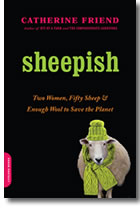I rarely read non-fiction, despite the fact that there are fabulous writers producing fascinating works. Though I began my professional life as a journalist, my feet have been firmly planted in fiction for years now. Note that I said “rarely.” This weekend has been an exception.
With a three-day stretch of time and a desire to be happily indolent, I finished the newest Janet Evanovich book, Smokin’ Seventeen. Reading Evanovich is sort of like having dessert first, middle and last. It’s an indulgent fix of fun. I’d also just finished Chris Bohj alian’s Water Witches, catching up on his earlier work that I’d somehow missed.
alian’s Water Witches, catching up on his earlier work that I’d somehow missed.
Floating about our house was an unlikely book with a cover featuring a sheep wearing a scarf and hat. “Sheepish“ by Catherine Friend claimed to be a story of “two women, fifty sheep and enough wool to save the planet.” Who wouldn’t notice a tag line like that?
I grew up next to my grandparents’ dairy farm, so I’m not unfamiliar with farm life. When this country girl went city, I pretty much left behind the charm of the farm. Then I relocated again from bustling New Haven, Connecticut to the rural wilds of Massachusetts; I’ve recaptured a child’s pleasure in seeing fields of farm animals.
In Groton, there are remarkable herds of white-belted Galloways that look like bovine Oreos; Scottish Coos that are short, sturdy steers of shaggy coat and impressive curved horns; llamas ranging alongside sheep; horses frolicking in paddocks. I look at them and think it would be great to dump my demanding day job and find an old farm — real estate prices for buyers couldn’t be better — and make a go at it.
Sheep farming always appealed to me because the animals get to live decently long lives in open pasture, contributing their wool. And sheep have those sweet smiling faces. Yes, the lambs are eventually sold off for consumption, but they too have a free-ranging life before they meet their demise.
One of my favorite farm stands, Springdell in Littleton, has just such a business, offering not only lamb meat but dyed skeins of wool. The fact that I see people working Sprindell fields from early morning til late at night has set off a warning bell — be careful what you wish for.
In Sheepish, Catherine Friend gives you the chance to enjoy sheep farming without ever chasing an errant ewe or wandering through muck during lambing time. Her use of the word sheepish, by her own definition, means liking sheep (not in some creepy unnatural way), rather than the more traditional definition. Chapter by chapter, her humor and excellent storytelling take you through her early days on her Minnesota farm with her longtime partner, right up to a sort of 20 year retrospective on “was it worth it?”.
Friend says “yes it was.” Reading her book was, as well. Her memoir provided me with my own farming fiction. Next, maybe I’ll read Into Thin Air so that I can check mountain climbing off my wish list as well.